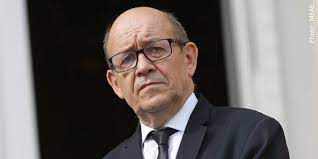Understanding the case means going back eight years – 2015 to be precise to unravel the latest episode in the diplomatic arm-wrestling between Mali and its former colonial power France.
The presiding magistrate of the second cabinet at the High Court of Commune III of the district of Bamako (Economic and Financial Pole) has “invited” the French Minister of Foreign Affairs, Jean Yves Le Drian to appear before it on June 20 over “a matter concerning him.”
At the heart of the summons issued on April 20, the Malian judge said that the case is related to “civil society and MPC/C Jean Yves Le Drian, for attacks on public property and other offenses at the expense of the state of Mali.”
The year was 2015, a time when Jean Yves Le Drian was France’s Defense minister and allegedly used underhand measures to pressure then Malian president Ibrahim Boubacar Keita into offering Oberthur Technologies (now IDEMIA) a lucrative tender to print biometric passports for a period lasting fifteen years.
This alleged arm-twisting from a senior official of the French government was roundly denounced by Maliko, a Malian civil society coalition which is in the good books of the military government in Bamako.
The movement filed a complaint on February 22 with the economic and financial division of the high court in Bamako against Jean Yves Le Drian and his son Thomas over “complicity in the illegal favoritism” on behalf of Oberthur Technologies.
The movement, which is close to the junta that currently rules Mali, holds that “the embezzlements led to the damage to the country’s public funds,”.
This is literally the same terms used by the judge of the 2nd cabinet, who, through this summoning of the French minister, risks further aggravating the already strained relations between France and its former colony.
The two countries have not been speaking the same language of diplomacy for some time.
Mired in a jihadist insurgency that has turned part of the country into a lawless zone, the Malian authorities blame France for “abandoning the mission mid-air”.
This was shortly after French President Emmanuel Macron announced in June last year that Operation Barkhane in the Sahel would be reviewed.
Speculations about the alleged involvement of the controversial Russian private military firm Wagner in the West African country have not helped ease the tension between the two countries.
On May 2, Bamako unilaterally terminated a series of defense pacts with Paris over what it called “flagrant and …multiple violations” of its airspace by French aircraft.
In response, France denounced the move as “unjustified” and emphasised that the withdrawal of French forces from Malian territory, which was already underway, would continue “in accordance with the commitments made to its partners and in a spirit of coordination and respectful dialogue with the Malian forces.”
AC/los/id/lb/as/APA


